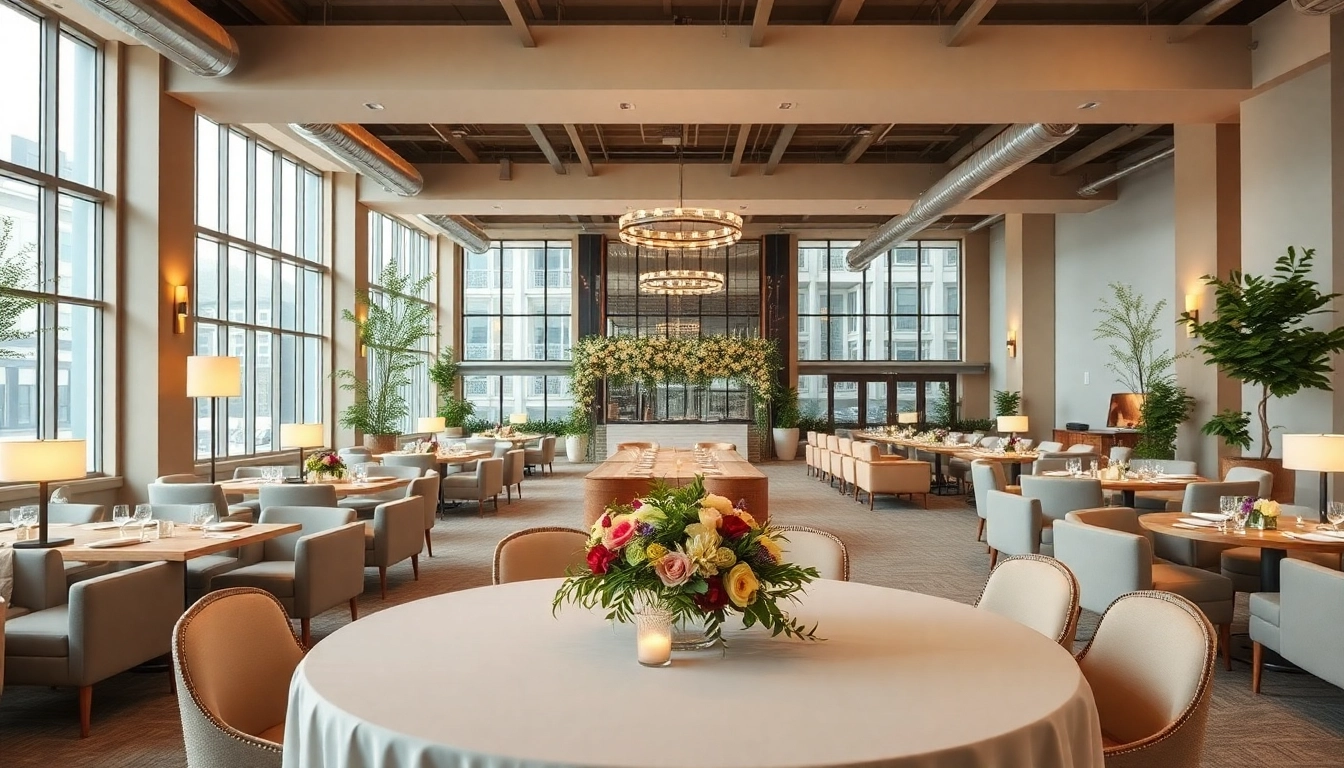Understanding Different Types of Event Space
Defining the Concept of Event Space
An event space is a designated area designed to host gatherings, whether formal or informal. These spaces can vary widely in size, style, and purpose—from corporate meetings and conferences to weddings and parties. As organizations and individuals host a myriad of events, understanding the concept of event space becomes crucial for successful planning and execution. In essence, an event space can be anything from a ballroom to a garden, equipped to facilitate gatherings effectively.
Exploring Indoor vs. Outdoor Event Space
Choosing between indoor and outdoor event spaces significantly impacts the atmosphere and logistics of your event. Indoor spaces, such as banquet halls and conference rooms, provide controlled environments that are less susceptible to weather changes, allowing for year-round usability. They come equipped with necessary amenities, including audiovisual equipment and climate control.
On the other hand, outdoor event spaces offer a unique aesthetic and can create a memorable experience, appealing to those seeking a natural backdrop. Gardens, parks, or open-air terraces are popular choices for events like weddings, picnics, or community festivals. However, they require careful consideration regarding seasonal weather, permits, and accessibility issues.
Choosing Between Unique and Traditional Event Space
The choice between unique and traditional event spaces often boils down to the theme and type of the event. Traditional venues, such as hotels and convention centers, provide professionalism and reliability, often hosting a range of corporate events. They typically come with dedicated staff, catering options, and built-in technology.
In contrast, unique event spaces—such as art galleries, historical buildings, or rustic barns—can create a distinctive atmosphere that enhances the event’s theme. Choosing such venues can result in higher engagement and lasting memories for guests. Nonetheless, planning in unique settings often involves more logistical considerations, such as rentals for seating and equipment.
Key Factors for Selecting an Event Space
Location and Accessibility for Your Event Space
The first step in selecting an event space is evaluating its location and accessibility. A venue that is conveniently situated near major transportation hubs increases attendance, especially for corporate events that may attract participants from various regions. Additionally, ample parking and accessibility for people with disabilities are paramount to ensuring a positive experience for all attendees.
Furthermore, understanding the surrounding area can enhance the event experience—considering nearby hotels, restaurants, and attractions can enrich guest engagement before and after the event.
Capacity Considerations for Your Event Space
Establishing the right capacity is critical to ensure comfort and space utilization during an event. Oversized venues can make the gathering feel sparse, whereas undersized spaces can lead to overcrowding, resulting in discomfort and diminished experience. Assess your guest list thoroughly and select a venue that comfortably accommodates your audience while allowing for flow and interaction.
It is also prudent to consider the layout of seating arrangements, stage settings, and communal spaces, which can influence how effectively the space meets the event’s needs.
Amenities to Look For in an Event Space
Amenities play a crucial role in the success of any event. Consider essential features such as audiovisual equipment, Wi-Fi access, and kitchen facilities that can cater to your specific needs. For corporate events, breakout rooms can add value, while comfortable furniture and restrooms must be considered regardless of event type.
Moreover, check for additional amenities like on-site catering services, decoration options, and helpful staff, which can further streamline event management and execution.
Designing Your Event Space for Maximum Impact
Layout Strategies for an Effective Event Space
Effective layout strategies are vital for facilitating interaction and engagement in your event space. Consider factors such as flow, accessibility, and the overall experience you want to create for your guests. Popular layouts include theater-style seating for presentations, banquet setups for dining, or classroom setups for workshops.
Additionally, leaving space for movement and networking can enhance interaction among participants, encouraging collaboration and connection in professional settings or creating vibrant social atmospheres in private gatherings.
Incorporating Flexible Furniture in Your Event Space
Flexibility in furniture design is essential as it allows for almost endless configurations tailored to specific event requirements. Consider utilizing modular or movable chairs and tables that can be easily rearranged based on the event’s needs. Such flexibility not only enhances the aesthetic appeal but also assists in accommodating different types of activities throughout the event.
During the planning phase, work with the venue to understand the furniture availability and explore rental options for specialty pieces that align with your design vision.
Creating Ambiance: Lighting and Decor for Your Event Space
The lighting and decor of your event space play crucial roles in setting the mood and enhancing the overall experience. Consider using adjustable lighting systems that can be dimmed or brightened, depending on the atmosphere desired for specific segments of the event.
Decor elements such as floral arrangements, centerpieces, and thematic backdrops contribute to visual interest. When choosing decor, be mindful of color schemes and branding to ensure cohesiveness and positivity in guest perception. Incorporate local art or themed decorations that align with the event purpose to create a memorable ambiance.
Budgeting for Your Event Space
Understanding Rental Costs for Your Event Space
When budgeting for your event space, clearly understanding the rental costs is vital. These costs can fluctuate widely based on space type, location, and amenities offered. Be sure to explore different venues that fit your budget and consider what each package delivers in terms of service.
Additionally, inquire about peak versus off-peak rates, as booking during off-peak times can yield significant cost savings for many event planners without sacrificing quality.
Hidden Fees to Consider for Your Event Space
While planning your budget, keep in mind that hidden fees can arise during the venue rental process. These may include charges for equipment rentals, cleaning fees, staffing costs, and deposits that might be forfeited if specific cancellation policies are not adhered to.
To mitigate unexpected expenses, ask your venue manager for a complete breakdown of costs and thoroughly review the rental contract for any overlooked fees before signing.
Tips for Negotiating Rates for Your Event Space
Negotiating rates can save you a significant amount on your overall event budget. Begin conversations with venue managers well in advance of your desired date—this allows for more room to negotiate and helps establish a good relationship with venue staff. Highlight any flexibility in your dates, or if you are booking multiple dates, propose a package deal for better rates.
Don’t hesitate to ask about discounted rates for non-profit organizations or community initiatives, which can often lead to favorable terms. Finally, have backup options ready; being willing to explore alternatives can strengthen your negotiating position.
Promoting Your Event Space Effectively
Leveraging Social Media for Your Event Space
Social media is a powerful tool to promote your event space, reaching a wider audience and generating interest. Create a dedicated social media strategy that leverages platforms like Instagram, Facebook, and LinkedIn to showcase the venue’s potential through high-quality visuals and engaging content.
Utilizing hashtags relevant to event planning and local community events can help attract organic traffic, while paid promotions could enhance outreach to target demographics. Collaborate with local influencers or event planners to increase visibility and credibility around your space.
Networking with Event Planners for Your Event Space
Building relationships with event planners can prove beneficial, as professional connections often lead to referrals and recommendations. Attend industry networking events, both in-person and online, and actively participate in discussions showcasing your event space’s unique offerings.
Provide event planners with sample packages or promotional materials to facilitate their client presentations. Being at the forefront of industry events solidifies your position as a credible venue and helps an increasing number of event planners consider your space for future bookings.
Creating an Online Presence for Your Event Space
An effective online presence is critical for promoting your event space in today’s digital landscape. This includes designing a user-friendly website that clearly outlines your venue’s features, availability, and pricing structures. Include high-quality images and client testimonials to build trust and attract potential clients.
Incorporate search engine optimization (SEO) best practices within your website’s content to enhance visibility on search engines. Additionally, maintain updated social media accounts with regular posts, engaging content, and promotions on upcoming events at your space. This establishes your venue as a desirable location, increasing inquiries and bookings over time.



